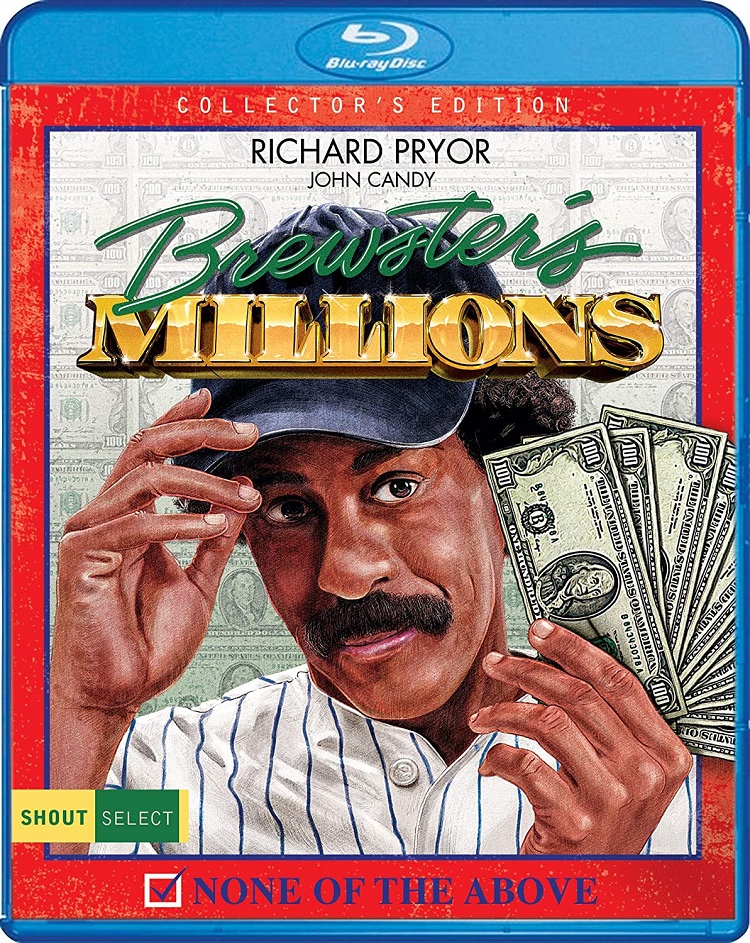
In 1902, George Barr McCutcheon, writing under the pseudonym of Richard Graves, wrote a novel entitled Brewster’s Millions. In it, a young man named Montgomery Brewster learns of a large inheritance of $7 million due to him after his uncle died. The stipulations of the will are strange – he can only earn the $7 million is he spends $1 million within one year’s time and manages to not own any assets at the end of it. The novel was turned into a Broadway play in 1906, a radio play in 1937, and has been adapted into no less than thirteen films. I don’t know what it is about that story that makes people keep adapting it. I guess we just like watching people spending lots of money in a short period of time.
The most famous film adaptation is no doubt the 1985 version directed by Walter Hill and starring Richard Pryor. I watched it hundreds of times as a kid. Well, maybe that’s an exaggeration but as I was watching it last night, my first viewing in at least two decades, I vividly remembered every scene. It stuck with me enough that when I created my first blog back in 2004 I named it “Brewster’s Millions.”
I’m not all that sure what made me love this movie so much while I was growing up. Watching it now, I can assuredly say it just isn’t that good. It certainly isn’t that funny for a movie starring Richard Pryor and John Candy. I have no doubt that the title of the film was exciting to me as a kid as you didn’t hear the name Brewster all that often. I don’t believe it was ever a film that made me burst out laughing, even as a kid. I don’t remember quoting lines from it as a kid or an adult. I think it really was the scenario of having to spend lots of money but never acquire assets. I do remember talking that over and over with my friends plotting out how we’d spend the money.
In this version, Montgomery Brewster is a minor league ballplayer (so minor league that his team’s stadium – the Hackensack, New Jersey Bulls – has a train running through the middle of the outfield. Actually that may have been part of its charm for me as I grew up in a small town with two major train lines running through it, trains were a part of daily life). One night while at a bar with his catcher Spike Nolan (John Candy), he hits on the wrong girl, gets into a scuffle with her boyfriend, and lands himself in jail. A man bails them out and takes them to a law firm where he learns of the inheritance and the rules of obtaining it. In this version, he has 30 days to spend $30 million in order to inherit $300 million.
The law firm desperately wants Brewster to lose the money as they’ll receive a substantial fee distributing the $300 million to various charities. They hire Angela Drake (Lonette McKee) to act as an accountant for his expenditures, making sure he follows the rules. Naturally, she becomes the love interest.
Brewster hires nearly everyone he runs into to do various jobs at hefty rates (although not too hefty and I wondered even as a kid why he didn’t just pay one guy $30 million to be his chauffeur or something). He throws extravagant parties. He pays to have his minor league team play an exhibition game with the New York Yankees. He buys a rare stamp for $1.2 million and uses it to mail a postcard to the law firm. As a kid, I thought this maneuver was genius; as an adult, I frown at the destruction of so rare a collectible. Eventually, he runs for mayor and spends enormous sums of cash all while running on a campaign to vote for “none of the above”.
Pryor was an observant and trenchant comedian who made some very funny movies, but he’s got nothing to work with in this script. The comedy comes from his exasperation at trying to spend so much while having nothing to show for it. The tension comes from not being able to tell anybody what he’s doing (for one of the rules is that the whole stupid ordeal must remain a secret). But we never really care about Brewster as a human being. He seems a decent enough fellow, but the movie spends so much time having him throw money around that it never bothers to give us a real character. John Candy has even less to do. He mostly dresses in outlandish suits and scolds Brewster for spending so much, so fast. Lonette McKee spends most of the film disgusted by Brewster’s behavior but somehow manages to fall in love with him anyway.
Walter Hill, who is better known for directing such films as 48 Hrs and Red Heat and for writing two Alien sequels, admits that he took this gig for the money and for giving himself another guaranteed hit under his belt. He does an adequate job here, but he’s done a lot better.
It is a weird thing to rewatch a film you loved as a kid and discover it’s not very good. I have to admit for all the negative things I’ve written in this review I still enjoyed myself. Maybe it was the nostalgia washing over me. Or maybe I still like to ponder how I’d spend $30 million. Whatever the case, I suspect I’m not alone. Certainly, there must be a lot of people who like this story concept because they keep adapting it.
Shout! Factory has just released a Collector’s Edition of Brewster’s Millions. It comes with a new audio commentary with film critics William Bibbiani and Witney Seibold, a new interview with screenwriter Herschel Weingrod, and the 1945 adaptation of the story starring Dennis O’Keefe and Helen Walker.